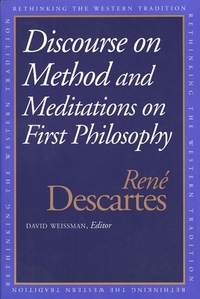Take a photo of a barcode or cover
133 reviews for:
Discourse on the Method and Meditations on First Philosophy
René Descartes, René Descartes
133 reviews for:
Discourse on the Method and Meditations on First Philosophy
René Descartes, René Descartes
reflective
I accidentally read three of his writings in one (Discourse on Method, Meditations on First Philosophy, The Principles of Philosophy), but I’m glad I did because they complement each other quite well, and express pretty much the same ideas. His writing is very easy to follow, and I didn’t have to put in any extra effort to do so.
The following are just my reflections on his writing at this point in time, with my minimal knowledge and experience in life- just something to track my thinking.
I feel that his argument is that because god is defined as an infinite, perfect being and because he can conceive of the concept of infinite perfection, god must exist. I’m not sure how his triangle analogy helps with this logic though, because the “perfect triangle” does not exist. I feel that, based on his argument, it is more appropriate to say that this “god” exists within our minds as a standard of perfection to which we compare everything- a concept, rather than an entity. It is important to note that he is not speaking of the conventional “god”, so maybe it is my lack of understanding of his “god” that prevents me from accepting his logic.
His logic is also based on his underlying axiom that the self as a thinking being is the only certainty, and from that, follows reason. He explains that he knows this because the senses are capable of deception. However, I could argue that these errors of the senses merely exist, but there are different extents of error- I could argue that sight only fails us in acute settings like hallucinations, where overall not much significance can be placed, whereas bad reasoning could potentially rationalise the existence of an entire god even with one misstep in the line of reasoning and I think that is more detrimental- he even said that “[some people can make error in even the simplest of geometry problems.]” I do overall understand and agree with what he is getting at with his logic, but this one particular part seems fishy.
I understand that this is because he knows that there is a state where you can completely be fooled by the senses, and in that state, like in a dream, you don’t see that you are not seeing the truth, but I think you can say the same for reason if you have error in your reasoning and train of thought.
I guess he is trying to prove god within the bounds of reason, not in the physical world but I think that is the difference; the theoretical world does not equal the physical world- he is saying the physical world is unreliable so we must rely on reasoning, but what we prove by reason doesn’t make something true.
reflective
slow-paced
Not my favorite (or most agreeable) philosopher, but he knows his stuff.
challenging
informative
slow-paced
challenging
reflective
slow-paced
I very much enjoyed re-reading this work on my own time, outside the bounds of assigned classroom reading. It was especially poignant following my recent "COGITO" tattoo!




